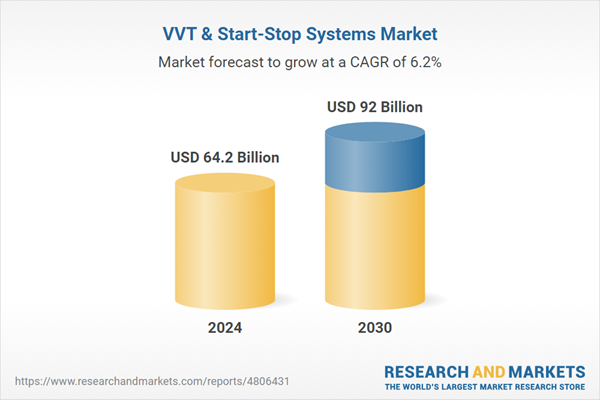Global VVT & Start-Stop Systems Market - Key Trends & Drivers Summarized
Why Are VVT & Start-Stop Systems Becoming Essential in Modern Automobiles?
Variable Valve Timing (VVT) and Start-Stop systems have become essential components in modern automobiles, significantly contributing to fuel efficiency, reduced emissions, and enhanced engine performance. VVT systems optimize engine timing by adjusting the timing of the intake and exhaust valves, ensuring better combustion and power output. On the other hand, Start-Stop systems automatically shut down and restart the engine to reduce idle time, particularly in urban driving conditions, thereby reducing fuel consumption and emissions. The growing focus on sustainability and the increasing demand for fuel-efficient vehicles are driving the adoption of VVT & Start-Stop systems globally. Automakers are incorporating these technologies to meet stringent emission regulations and enhance the overall driving experience.What Technological Innovations Are Driving the VVT & Start-Stop Systems Market?
The VVT & Start-Stop Systems market is being propelled by technological advancements in engine management, electronic controls, and hybrid powertrains. The development of more sophisticated VVT systems, such as Continuous Variable Valve Timing (CVVT) and Dual Variable Valve Timing (DVVT), is improving engine efficiency and performance. Start-Stop systems are becoming more advanced with the integration of regenerative braking, which captures and stores energy during braking to power the vehicle's electrical systems. Additionally, advancements in battery technologies, such as enhanced lead-acid and lithium-ion batteries, are improving the efficiency and reliability of Start-Stop systems. The integration of AI and machine learning algorithms for predictive engine management and optimization is further enhancing the functionality of these systems.What Challenges and Opportunities Are Present in the VVT & Start-Stop Systems Market?
The VVT & Start-Stop Systems market faces challenges such as high development and integration costs, potential wear and tear issues, and the need for consumer awareness regarding the benefits of these technologies. The cost of developing and integrating VVT and Start-Stop systems can be significant, especially for smaller automotive manufacturers. Additionally, frequent engine start-stop cycles can lead to increased wear and tear on engine components, requiring more robust designs. However, these challenges present opportunities for innovation and market growth. The increasing focus on hybrid and electric vehicles is driving the demand for more efficient VVT systems and advanced Start-Stop technologies. The development of more durable components, enhanced battery systems, and improved engine management algorithms is expected to further boost the adoption of these systems. Government regulations promoting fuel efficiency and emission reduction are also creating a favorable environment for market expansion.The Growth in the VVT & Start-Stop Systems Market Is Driven by Several Factors…
The growth in the VVT & Start-Stop Systems market is driven by several factors, including the increasing demand for fuel-efficient vehicles, advancements in engine control technologies, and stringent emission regulations. The rising awareness of environmental sustainability and the need to reduce fuel consumption in urban driving conditions are major drivers for Start-Stop systems. Technological innovations, such as advanced VVT systems, regenerative braking, and improved battery management, are enhancing the efficiency and reliability of these systems, further propelling market growth. Additionally, the shift towards hybrid and electric vehicles, which require advanced engine management systems, is contributing to the expansion of the VVT & Start-Stop Systems market. The growing focus on reducing greenhouse gas emissions and the implementation of strict emission norms by governments worldwide are also boosting the adoption of these technologies in the automotive industry.Report Scope
The report analyzes the VVT & Start-Stop Systems market, presented in terms of market value (US$ Thousand). The analysis covers the key segments and geographic regions outlined below.- Segments: Fuel (Gasoline VVT System, Diesel VVT System); Technology (VVT, Start-Stop System); Valve Train (DOHC, SOHC); Vehicle Type (Passenger Car, Commercial Vehicle).
- Geographic Regions/Countries:World; United States; Canada; Japan; China; Europe (France; Germany; Italy; United Kingdom; and Rest of Europe); Asia-Pacific; Rest of World.
Key Insights:
- Market Growth: Understand the significant growth trajectory of the VVT Technology segment, which is expected to reach US$67.5 Billion by 2030 with a CAGR of a 4.2%. The Start-Stop System segment is also set to grow at 13.5% CAGR over the analysis period.
- Regional Analysis: Gain insights into the U.S. market, valued at $17.6 Billion in 2024, and China, forecasted to grow at an impressive 5.9% CAGR to reach $14.4 Billion by 2030. Discover growth trends in other key regions, including Japan, Canada, Germany, and the Asia-Pacific.
Why You Should Buy This Report:
- Detailed Market Analysis: Access a thorough analysis of the Global VVT & Start-Stop Systems Market, covering all major geographic regions and market segments.
- Competitive Insights: Get an overview of the competitive landscape, including the market presence of major players across different geographies.
- Future Trends and Drivers: Understand the key trends and drivers shaping the future of the Global VVT & Start-Stop Systems Market.
- Actionable Insights: Benefit from actionable insights that can help you identify new revenue opportunities and make strategic business decisions.
Key Questions Answered:
- How is the Global VVT & Start-Stop Systems Market expected to evolve by 2030?
- What are the main drivers and restraints affecting the market?
- Which market segments will grow the most over the forecast period?
- How will market shares for different regions and segments change by 2030?
- Who are the leading players in the market, and what are their prospects?
Report Features:
- Comprehensive Market Data: Independent analysis of annual sales and market forecasts in US$ Million from 2024 to 2030.
- In-Depth Regional Analysis: Detailed insights into key markets, including the U.S., China, Japan, Canada, Europe, Asia-Pacific, Latin America, Middle East, and Africa.
- Company Profiles: Coverage of players such as Aptiv PLC, Bayerische Motoren Werke AG (BMW GROUP), BorgWarner, Inc., Continental AG, Denso Corporation and more.
- Complimentary Updates: Receive free report updates for one year to keep you informed of the latest market developments.
Some of the 12 companies featured in this VVT & Start-Stop Systems market report include:
- Aptiv PLC
- Bayerische Motoren Werke AG (BMW GROUP)
- BorgWarner, Inc.
- Continental AG
- Denso Corporation
- European Automobile Manufacturers Association (ACEA)
- General Motors Company
- Hyundai Motor Group
- Infineon Technologies AG
- Japan Automobile Manufacturers Association, Inc. (JAMA)
This edition integrates the latest global trade and economic shifts into comprehensive market analysis. Key updates include:
- Tariff and Trade Impact: Insights into global tariff negotiations across 180+ countries, with analysis of supply chain turbulence, sourcing disruptions, and geographic realignment. Special focus on 2025 as a pivotal year for trade tensions, including updated perspectives on the Trump-era tariffs.
- Adjusted Forecasts and Analytics: Revised global and regional market forecasts through 2030, incorporating tariff effects, economic uncertainty, and structural changes in globalization. Includes historical analysis from 2015 to 2023.
- Strategic Market Dynamics: Evaluation of revised market prospects, regional outlooks, and key economic indicators such as population and urbanization trends.
- Innovation & Technology Trends: Latest developments in product and process innovation, emerging technologies, and key industry drivers shaping the competitive landscape.
- Competitive Intelligence: Updated global market share estimates for 2025, competitive positioning of major players (Strong/Active/Niche/Trivial), and refined focus on leading global brands and core players.
- Expert Insight & Commentary: Strategic analysis from economists, trade experts, and domain specialists to contextualize market shifts and identify emerging opportunities.
Table of Contents
Companies Mentioned (Partial List)
A selection of companies mentioned in this report includes, but is not limited to:
- Aptiv PLC
- Bayerische Motoren Werke AG (BMW GROUP)
- BorgWarner, Inc.
- Continental AG
- Denso Corporation
- European Automobile Manufacturers Association (ACEA)
- General Motors Company
- Hyundai Motor Group
- Infineon Technologies AG
- Japan Automobile Manufacturers Association, Inc. (JAMA)
Table Information
| Report Attribute | Details |
|---|---|
| No. of Pages | 229 |
| Published | January 2026 |
| Forecast Period | 2024 - 2030 |
| Estimated Market Value ( USD | $ 64.2 Billion |
| Forecasted Market Value ( USD | $ 92 Billion |
| Compound Annual Growth Rate | 6.2% |
| Regions Covered | Global |









